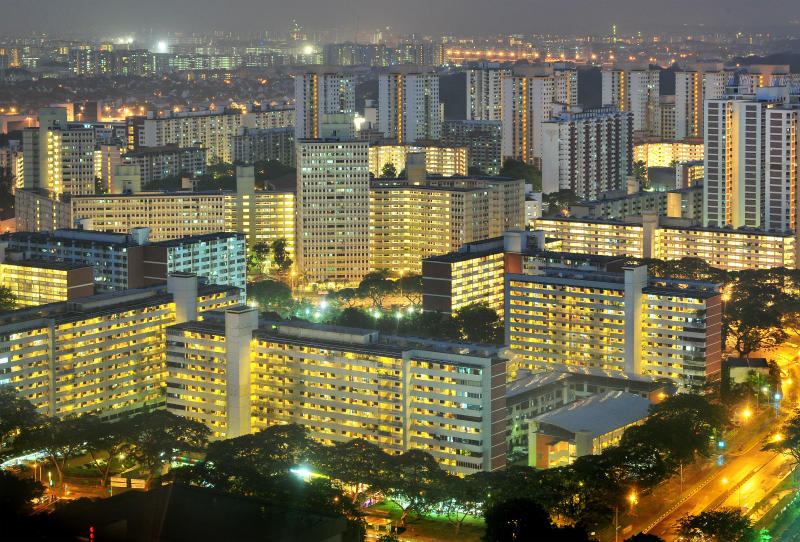Consumers may see increase in electricity prices next year: Tan See Leng
Sign up now: Get ST's newsletters delivered to your inbox

Eligible households will continue to receive U-Save rebates to support them with their utility expenses , said the minister.
PHOTO: ST FILE
Follow topic:
SINGAPORE - While most consumers will not see an immediate increase in electricity prices, they may see a rise in their electricity bills next year with energy prices increasing globally.
Most consumers in Singapore have been "somewhat cushioned" so far, with 99 per cent on standard price plans with retailers or the regulated tariff rate, said Minister for Manpower Tan See Leng in Parliament on Monday (Nov 1).
About 96 per cent of businesses are also on fixed price or discount-off-tariff plans.
Dr Tan, who is also Second Minister for Trade and Industry, said: "These have risen by far less than the price of gas or wholesale electricity. However, the sustained high fuel prices will eventually feed into our electricity bills to reflect the cost of electricity production."
Eligible households will continue to receive U-Save rebates to support them with their utility expenses , said the minister.
The Ministry of Trade and Industry will also work with the Ministry of Finance to monitor the situation and study whether further assistance is required for affected households and businesses, he added.
The minister was responding at length to 28 questions from MPs on electricity prices and energy security, following the recent exit of several retailers amid a volatile global energy market.
The current energy crisis is a result of several factors, he said.
A confluence of increased gas consumption from recovering economic activity, unusual weather events, lower than expected coal production and a series of gas production outages have disrupted supplies around the world.
Many major economies are also securing sufficient fuel supplies for the winter, compounding the impact on prices of fuel and electricity around the world.
As Singapore relies on imported natural gas for almost all of its electricity production, it is highly exposed to global supply and demand shocks.
These volatile market conditions have led to five electricity retailers - iSwitch, Ohm Energy, Best Electricity, UGS Energy, and SilverCloud Energy - pulling out of the market over the last three weeks.
These five retailers supply to about 9 per cent of all consumers. Retailers who wish to exit the retail electricity market are required to first approach other retailers to take on those consumers at the same terms and conditions.
If this fails, the consumer will be transferred to SP Group, where they can later choose to purchase electricity from another retailer.
As at end-October, about 140,000 households and 11,000 business accounts will either be transferred to another retailer, or back to SP Group.
On the issue of energy security, Dr Tan noted that over the years, measures have been put in place to secure Singapore's access to fuel supplies, such as having long-term supply contracts for piped natural gas (PNG) with Malaysia and Indonesia.
Power generation companies are also required to stockpile at least 60 days of fuel reserves, in the event of disruptions to natural gas supply.
The Energy Market Authority also ensures sufficient generation capacity to convert fuel into electricity.
There needs to be a reserve margin of at least 27 per cent above peak electricity demand. This figure currently stands at 52 per cent.
"We have sufficient fuel supplies and generation capacity today. However, given the unprecedented scale of this energy crunch, we are leaving nothing to chance," Dr Tan said, adding that EMA has been working closely with industry stakeholders on pre-emptive measures to further secure Singapore's fuel and electricity supply.
Singapore will also be diversifying its energy sources over the longer-term.
It was earlier announced that the Republic will be ramping up its solar capacity by 2030 to generate at least 2 gigawatt-peak of electricity, and will import up to 4 gigawatt of low-carbon electricity by 2035.
Dr Tan said: "Beyond this, we will continue to explore other low-carbon alternatives like hydrogen as well as geothermal energy. Collectively, these measures will make our power system more resilient and less susceptible to price and supply risks."
Responding to a question from Mr Gerald Giam (Aljunied GRC) on whether the Government will consider a special one-off additional electricity rebate to assist low-income households, Dr Tan said his ministry is exploring further means of help with the Ministry of Finance.
Households living in four-room or smaller Housing Board flats also receive U-Save vouchers to help them with utility bills, with rebates amounting to about six months of bills a year for some.
And while the Government will continue to support lower-income households, it is important that Singaporeans adopt energy conservation strategies as a way of life, as Singapore will have to import natural gas for most of its electricity needs, said Dr Tan.
He was responding to Mr Saktiandi Supaat (Bishan-Toa Payoh GRC) who asked what more can the Government do to help consumers further reduce their energy consumption.
Dr Tan said: " We can start small, we can turn the lights off when we're not in the room. We can opt to use the fan more often rather than using air conditioning... and switch to more energy efficient appliances where possible."

